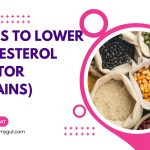Can Tomatoes Cause Diarrhea: 5 Facts explained.
Our content is not intended nor recommended as a substitute for medical advice by your doctor. Use for informational purposes only.
1. Tomatoes rarely cause diarrhea.
Tomatoes are one of the most widely consumed foods. It is infrequent for tomatoes to cause diarrhea.
Both tomatoes allergy and tomatoes intolerance is rare. Overall, allergy and intolerance to tomatoes are seldom reported in the studies. Tomato allergies are often apart from part of multifood allergies (reference).
No study has estimated the exact incidence of tomato-induced diarrhea in the community. However, studies show that tomato allergy ranges from 1.5-16%
Moreover, Tomatoes are NOT a trigger for IBS-diarrhea as they are low in FODMAP (reference).
So, if you have diarrhea after eating tomatoes, It is better to consult your doctor or dietitian to confirm this condition. Your diarrhea could be due to other causes.
2. Tomatoes cause diarrhea by three mechanisms.
Tomatoes cause diarrhea by one of three mechanisms:
- Tomato allergy.
- Tomato intolerance.
- Infections (Tomato contamination).
A. Tomato allergy.
As we mentioned before, Tomato allergy is rare and often occurs in patients allergic to multip foods. Moreover, Tomato allergy is type one hypersensitivity, which causes (also known as contact allergy).
With tomato allergy, histamine is released into the exposed areas such as skin, nose, respiratory and digestive tracts. So, diarrhea is not the only nor the main symptom of tomato allergy.
People who are allergic to tomatoes are also allergic to other foods from the nightshade family, such as:
- Potatoes.
- Eggplants.
- bell peppers.
- Tobacco plants.
Tomato allergy predominantly presents with skin allergy symptoms such as skin rashes, urticaria, or eczema. Also, people allergic to tomatoes are allergic to latex (latex-fruit syndrome) (reference).
Other symptoms of allergy include:
- Digestive system: abdominal pain, nausea, vomiting, distension, and diarrhea.
- Throat: itching sensation.
- Respiratory: sneezing, coughing, asthma (wheezes), or runny nose.
- Swollen lips, tongue, or face.
Diarrhea alone is an extremely rare presentation of tomato allergy; however, other skin and respiratory symptoms often present with tomatoes allergy. In addition, the patient is usually allergic to different foods and pollens.
B. Tomato intolerance
Tomato intolerance is another mechanism of tomato-induced diarrhea. However, tomato intolerance is a less severe form of food reaction, and it is thought to be more common than tomato allergy.
With tomato intolerance, only digestive symptoms are present. And this may explain diarrhea after eating tomatoes without allergy symptoms.
We don’t know the exact prevalence of tomato intolerance, but it is also rare.
The differences between tomato allergy and tomato intolerances are in the table below (reference).
| Food intolerance | Food allergy |
| Affects 15-20% of the population | Affects nearly 2-5% of adults |
| Difficulty digesting certain types of food (not immune-mediated allergy). | An immune-mediated reaction to certain foods or food components. |
| – Causes “recurrent acute” or “chronic” attacks of diarrhea. – Slow onset (symptoms appear hours or days after eating). | – Usually causes acute attacks related to the ingestion of offending food. – Rapid onset of symptoms (often within minutes). |
| Intestinal symptoms: diarrhea, extensive gas, bloating, and abdominal pain | Intestinal symptoms are the same. |
| No extra-intestinal symptoms | Extra-intestinal symptoms like rashes, urticaria, swollen lips or face, or severe life-threatening allergic reactions. |
| The severity of your symptoms is proportional to the amount you eat from the offending food. | Even trace amounts of the offending food can produce severe symptoms. |
Common offending foods:
| Common offending foods: (examples)
|
C. Infection.
Food-borne infections associated with fresh vegetables such as tomatoes are increasing nowadays. The most common organism that can cause diarrhea after eating tomatoes is E. Coli (reference).
E-coli and other organisms contaminating tomatoes can be the cause of diarrhea. Because it is an infection, diarrhea is often occasional and often present with other infections such as severe abdominal colics, fever, etc.
3. The best ways to figure Tomatoes allergy and intolerance.
If you get diarrhea every time you eat tomatoes, the best decision is to consult your doctor or registered dietitian about your condition. Your doctor or dietitian will often request one or more of the following:
A. Elimination diet.
The idea behind an elimination diet is to eliminate tomatoes from your diet for two weeks or more. Then, if diarrhea stops, tomatoes may be the cause.
Then a gradual introduction of small amounts of the offending food (tomatoes) and watch out for the effects of the re-introduction.
Keeping a food diary is extremely helpful in such cases. A food diary is a simple way to record all of the foods and symptoms you experience after eating foods such as tomatoes.
Learn more about the elimination diet and food diaries.
B. Allergy and intolerance Testing.
Several tests for tomatoes allergy and tomatoes intolerance exists. Consult your doctor or nutritionist to determine the tests that suit your case.
4. Don’t stop eating tomatoes.
If you have diarrhea while eating tomatoes, don’t rush to a conclusion and cut tomatoes entirely from your diet (unless your doctor tells you to do so).
Cutting tomatoes from your diet without confirming its relation to diarrhea is a bad idea because:
- Tomatoes rarely cause diarrhea, and you may have another cause for diarrhea, such as lactose intolerance or IBS.
- Tomatoes are potent antioxidants (containing lycopene, which has many health benefits and antibacterial activity).
- Tomatoes are very rich in vitamins and minerals such as potassium, folic acid, vitamin C and Vitamin K.
- Tomatoes may reduce your risk of cardiovascular diseases and several cancers.
- Tomatoes are perfect for your skin health.
It is worth mentioning that tomatoes may protect you from diarrhea. One study found that Tomato consumption decreases the risk of diarrhea and respiratory infections in children (reference).
5. Always consider alternative causes of diarrhea.
Diarrhea has several causes; the correlation of tomatoes with diarrhea doesn’t always mean causation.
Diarrhea can be due to other more common conditions such as:
- Irritable bowel syndrome.
- Lactose intolerances (found in milk and dairy products).
- Fructose intolerances (found in many fruits).
- Celiac disease.
- Inflammatory bowel disease.
Always consult your doctor before making any health or dietary decisions.
- Evidence-based
- Written by a doctor.

Related Posts:
- Can you Die from Acute Pancreatitis: 6 Facts & Statistics.
- How Long does it Take to Reverse a Fatty Liver? (5 Facts).
- IBS And Sugar: 10 Surprising Facts & When To Cut It Out
- Pooping mucus only: 12 Causes Explained (Dr. Farahat).
- Do Bananas Help With Diarrhea?
- Black Watery Diarrhea: 5 Causes & When To Worry.





